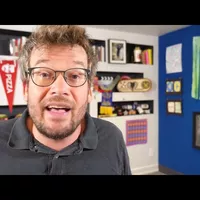My Religion and My Banned Books
Good morning Hank it's Tuesday so, lately my books, especially Looking for Alaska
and Turtles All the Way Down, have been removed from libraries and schools
in the U.S. due to their purported obscenity. I've talked about book banning before,
and I don't want to talk about it directly today, instead
I want to talk about what I think books do, and why I write them.
So half my life ago, I worked as a student chaplain
at a children's hospital. While there, I saw much of what I consider obscene.
I saw children die. I saw parents terrified not just about whether their kids would survive
emergency surgery but also about how they would ever pay the accompanying medical bills.
I saw things I don't care to repeat. All of it, obscene.
The fact that I was a chaplain often surprises people
who are familiar with me or my work. I think it surprises many evangelical Christians,
because they do not understand why a fellow Christian
would intentionally pollute the minds of young people
with books that include premarital sex and alcohol abuse.
And of course it also surprises many people who aren't religious because they're like,
why would a seemingly thoughtful person believe that every Sunday, all around the world,
bad wine suddenly turns into God's blood.
Now I don't generally talk much about my personal beliefs online,
because you, know, this is the internet, and I don't wanna.
But I continue to find religion a helpful approach
to the ancient conversation about how to live as a person in a world full of other people.
That said, one of the first things I learned as a chaplain
is that it's not about me and it's definitely not about my beliefs.
Right? Because, like, if somebody drowning in an ocean of grief, said to me that
their loved one had no afterlife,
it was not my job to question that; and if somebody told me that their loved one
was now in heaven, it was not my job to question that either.
My job was to listen–to really listen. I wasn't there to solve or
fix their pain, which could not be fixed; I was there to hear their pain and acknowledge it.
As my supervisor often told me: Don't just do something. Stand there.
That is what I have tried to do with my work. I have tried to write books that
don't just do something they stand there. I believe
that by just standing there, without judgment, stories can
proclaim the full humanity of their characters, and
in doing so can help us to see the humanity within ourselves.
But just as importantly, stories also invite us into other lives.
They help each of us to understand the richness and complexity of people who aren't like us.
In this sense, I kind of understand book banning because
I think books are a threat to many contemporary power structures–
because many of those power structures
want us to see other people– especially marginalized people–
whether they're marginalized because of race or sexuality or gender identity or mental illness
or whatever–power structures want us to see those people as less than fully human.
And so I would argue that if great books have an agenda,
it is not a liberal agenda or a gay agenda or a christian agenda–it is a humanizing agenda,
a mission to recognize and acknowledge human value within ourselves and others.
So Hank, in my faith tradition, we are called in the gospel of Matthew
not just to treat our friends or our neighbors as we would want to be treated,
or to treat people with similar value systems as we ourselves would want to be treated,
but we are called to treat all others as we would want to be treated.
To me, that does not mean deciding on someone else's behalf
what books they should be allowed to read, nor does it mean hiding from high school students
the realities of the human condition both sexual and otherwise.
To me what it means is working to make space so that others–
all others– can be treated, both by individuals and society
with the same rights, dignity, and respect that I would want for me, or for my family.
And I think efforts to restrict stories are often efforts
to restrict empathy. That's not in keeping with my faith,
but more importantly I don't think it's in keeping with a functioning society.
Hank, I'll see you on Friday

